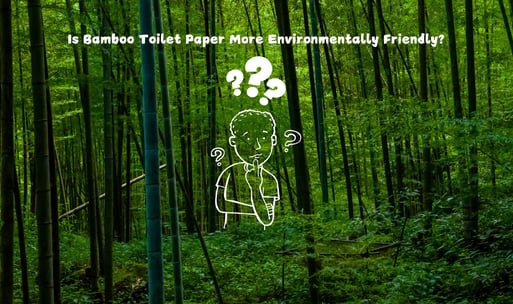Is Bamboo Toilet Paper More Environmentally Friendly?
Wondering if bamboo toilet paper is more eco-friendly? Learn how bamboo’s sustainability helps reduce deforestation and makes it a superior choice for your home.
8/25/20241 min read


Sustainability of Bamboo
Bamboo is one of the fastest growing plants on Earth making it an incredibly sustainable resource. Unlike traditional trees, which can take decades to mature bamboo can grow up to 3 feet in just 24 hours. This rapid growth means bamboo can be harvested more frequently without depleting natural resources making it a much more sustainable option than tree-based products.
Reduced Deforestation
Traditional toilet paper is typically made from hardwood or softwood trees contributing significantly to deforestation. The loss of forests not only impacts wildlife habitats but also contributes to climate change. Bamboo toilet paper on the other hand, requires far less land and water helping to preserve forests and reduce carbon emissions.
Biodegradability and Composability
Bamboo toilet paper is fully biodegradable breaking down more quickly than conventional toilet paper made from trees. It’s also compostable which means it can return to the earth naturally leaving a minimal environmental footprint. This is a significant advantage for those looking to reduce waste and support a more circular economy.
Less Chemical Usage
The production of bamboo toilet paper typically involves fewer chemicals than traditional toilet paper. Many brands, like Master Roll use processes that avoid harsh chemicals such as chlorine bleach, making bamboo toilet paper a safer option for both your skin and the environment.
Conclusion
Switching to bamboo toilet paper is a simple yet impactful way to reduce your environmental footprint. With its sustainable sourcing, reduced deforestation, and eco-friendly production processes, bamboo toilet paper is indeed a better choice for the environment. By making this switch you’re not only choosing a high-quality product but also contributing to a greener more sustainable future.
Introduction:
As more people seek eco-friendly alternatives in their daily lives, the question arises: is bamboo toilet paper better for the environment? The short answer is yes, and here’s why.
MASTER ROLL
Office Address:
© 2025. All rights reserved.
Get in touch
Bartle House Oxford Court , Manchester
M2 3WQ
Contact us
Organisation Number:14915394
